Presentation of the 2015 Israeli Democracy Index
The President's Residence
Jerusalem
Participation by invitation only
On Tuesday, Nov. 10, IDI President Yohanan Plesner and Tamar Hermann, academic director of IDI’s Guttman Center for Public Opinion and Policy Research, presented the 2015 Israeli Democracy Index to President Reuven Rivlin. This year, survey questions focused on Israelis' views about their personal and national situation, government performance, the character of the state, the relationship between government and citizens, democratic rights and freedoms, and Jewish-Arab relations. The index also ranked Israel according to a number of international indices.
Download a summary of this year's index>>
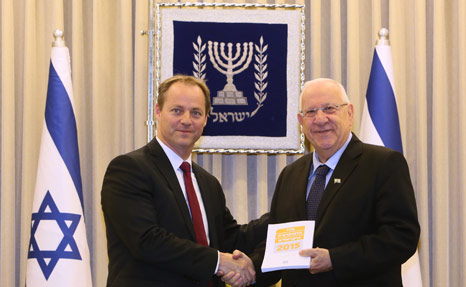
IDI President Yohanan Plesner presents the Israeli Democracy Index 2015 to President Reuven (Ruvi) Rivlin
How is Israel Doing?
When asked how they see Israel’s overall situation, the Israeli public most frequently deemed it to be “so-so” (38.7%). The share who describe Israel’s situation as either “good” or “very good” (41.2%), however, clearly outstrips the share who see it as “bad” or “very bad” (18%). Jewish respondents deem Israel’s situation to be positive more frequently than Arab respondents (43.7% vs. 28.8%) and Arab respondents deem Israel’s situation to be negative more frequently than Jews (29.1% vs. 16%).
Israelis see their personal situation as even more positive than the country’s situation. Some 74.7% of Israelis describe their personal situation as “good” or “very good,” 19.8% classify it as “so-so,” and 4.8% deem it “bad” or “very bad.”
When broken down by nationality, 76.5% of Jews categorize their situation as positive, as do 65.1% of Arab respondents. When asked if they would want to emigrate from Israel if they could obtain citizenship in the United States or another Western country, a very large majority of respondents—84.3% of Jews and 83.4% of Arabs—indicated that they wish to remain in Israel.
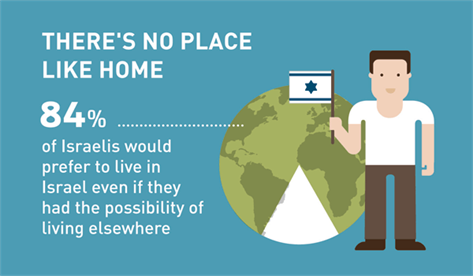
State and Governance
Trust in Government and Institutions
- High marks – The institution that enjoys the highest level of trust among Jews is the Israel Defense Forces (93.4%), with the President of Israel in second place (76%), and Israel’s HMOs in third (70.6%). Among Arab respondents, the government institutions and public bodies that enjoy the highest rate of trust are Israel’s HMOs (82.2%), the National Insurance Institute responsible for social security (65.3%), and the Supreme Court (63%).
- Low marks – The prevailing view of government performance in Israel is highly critical. A sizeable proportion of Israelis hold that government corruption is common; 45.4% of the Jewish public and 60.8% of the Arab public think that Israel’s leadership is corrupt. A majority of Israelis (54.4%) feel that Knesset members do not work hard and are not doing their job as well as they should. A high ercentage (77.7%) feel unable to influence government policy, and there is a pronounced lack of trust in key institutions of democracy. Trust in the government is 36.2%, trust in the Knesset is 35.4%, and trust in Israel’s political parties is only 19.1%.
Differing views – In several areas, a great disparity was found between evels of confidence in institutions among Jews and Arabs:
- Whereas 93.4% of Jews have trust in the Israel Defense Forces, only 38.9% of Arabs have trust in the IDF.
- While President Reuven Rivlin enjoys the trust of 76% of Jewish respondents, only 38.9% of Israel’s Arab citizens trust srael’s President.
- While the National Insurance Institute instills confidence in65.3% of Arab respondents, it instills confidence in only 35.3% of Jews.
The Status of the Supreme Court
Approximately two thirds of Jews in Israel (62.2%) express a high level of trust in the Supreme Court, which enjoys more public confidence than the police (42.2%), the government (37.5%), the Knesset (33.8%), and Israel’s political parties (15.1%). Trust in the Supreme Court is higher among the left (83.6%) than the right (50.1%), and is especially low among ultra-Orthodox and Orthodox Jews. Similar percentages of Jews and Arabs have trust in the Court (62.2% and 63% respectively).
The majority of the public (56.0%) is opposed to changing the current system, in which the Supreme Court can overturn laws passed by the Knesset. Opposition to stripping the Supreme Court of the authority to overrule the Knesset is greater among Arabs (63.8%) and lower among Jews who identify themselves as politically right-wing (43.4%).
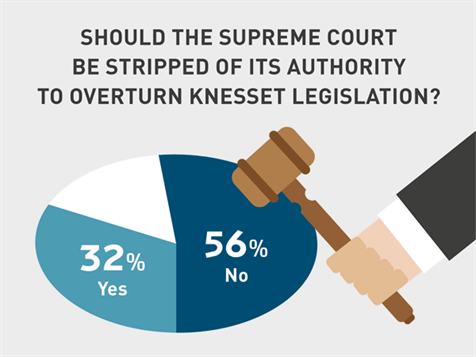
Freedom of Expression and Privacy
A majority of the Israeli public support freedom of expression, and specifically the right of citizens to criticize the state. When respondents were asked whether Israelis should be legally prohibited from expressing harsh criticism of the state in public, 70.4% of the total sample (69.2% of Jews and 76.2% of Arabs) expressed opposition to this notion. This opposition crosses all political lines, though it is more pronounced on the left than in the center or the right of the political map. When asked whether they agree that in order to protect national security, the state should be permitted to monitor what citizens post on the Internet, 59.1% of the Jewish public supported such intrusions on ndividual freedom of expression. A majority of Arabs (53.8%), in contrast, oppose granting the state permission for such surveillance. Surprisingly, younger Jewish respondents are more strongly in favor of such monitoring than older ones.
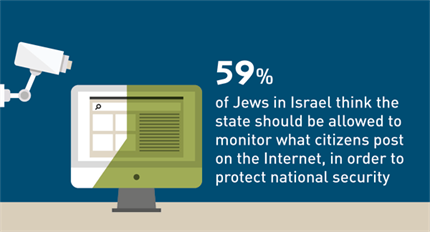
Israeli Society
Social Tensions
When asked what the greatest area of friction is in Israeli society, both Jewish respondents (64.1%) and Arab respondents (43.7%) cited the tension between Jews and Arabs as the greatest tension. Overall, 47% of Israelis think that the greatest tension in Israeli society is the tension between Jews and Arabs.
When asked to assess the level of friction between members of specific pairs of contrasting population groups in Israeli society, 67.1% of the total sample rated tension between Jews and Arabs as high. This was followed by tension between the political right and left (deemed high by 59.7%), tension between rich and poor (50.6%), tension between religious and secular Jews (47.5%), and tension between Ashkanazi and Mizrahi Jews (24%). There was a sharp rise in the number of people who deem tension between Arabs and Jews and left and right to be high compared to 2014. Perceived tensions between rich and poor, religious and secular, and Ashkenazi and Mizrahi Jews in Israel have dropped slightly since 2014.
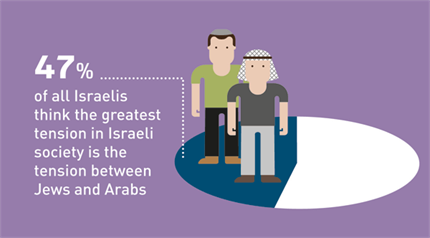
Attitude toward the “Other”
Jews and Arabs differed considerably on the neighbors they would find least desirable. When asked if it would bother them to live next to eight groups of “others,” Jewish respondents indicated that they would be most troubled by the prospects of living next to foreign workers (48.5%), an Arab family (36.1%), and people with mental health disorders (31.5%).
In keeping with the results of previous years, Arab respondents would be most concerned about living next to ultra-Orthodox Jews (42.6%). This was followed by a same-sex couple (40.4%) and people with intellectual/ developmental disabilities (36.4%). Strikingly, only 11.4% of Arab respondents would be bothered by living next to a Jewish family.

Discrimination
There is a fairly broad consensus in the Israeli public that Arabs are discriminated against as compared to Jews. Israel’s Arab citizens hold this view more than Jews (86.9% vs. 54.1%). Respondents who identify with the left think there is discrimination against Arabs more than respondents on the right (80% vs. 44%), Ashkenazi Jews hold this view more than Mizrahi Jews (58.2% vs. 52%), and secular Jews hold this view more than ultra-Orthodox Jews (65.8% vs. 33.3%).
There is less consensus regarding discrimination against Mizrahim (Jews of Asian/African origin). Some 59.2% of Israelis think there is no such discrimination, while 32.2% think there is. Among Jews, 27.7% think Mizrahim face discrimination, while 55.8% of Arabs share this view. Only 16.4% of Ashkenazi Jews agree that there is discrimination against Mizrahim, while 42.2% of Mizrahim agree that there is such discrimination.
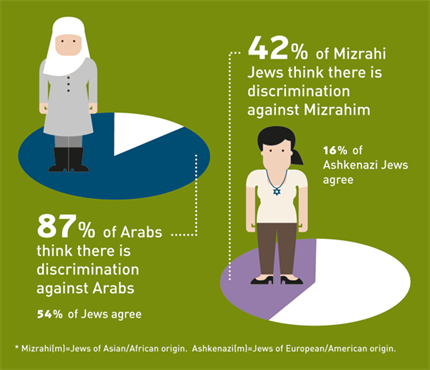
Arab-Jewish Relations
n Jewish Attitudes toward Arab Citizens
The attitudes of Israeli Jews toward Israel’s Arab minority are complex. On the one the hand, 54.1% of Jewish respondents acknowledge that there is discrimination against Arabs. An equal share oppose allocating greater funding to Jewish localities than to Arab localities. Most Jews are also not opposed to being treated by an Arab doctor (77.8%) or to having Arab teachers in Jewish schools (74.4%).
At the same time, only a small percentage of Jewish respondents are prepared to involve Arabs in crucial state decisions: 73.6% of Jewish respondents would require a Jewish majority for decisions regarding peace and national security, while 53.6% would require a Jewish majority for matters of governance, society, and the economy. In addition, 56.6% of Jews are opposed to including Arab parties and ministers in the government, 55.7% believe that it is not possible to identify as a Palestinian and be a loyal citizen of Israel, 42.3% think that Israel’s Arab citizens support the destruction of the state, and 39% think Arab citizens are a security threat.
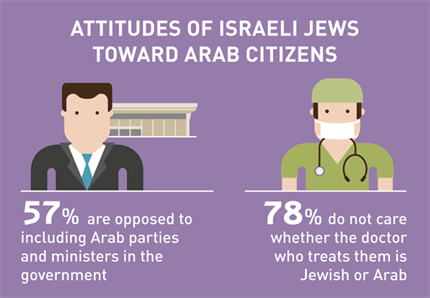
A majority of the Jewish public (71.3%) are opposed to granting Jews greater rights than non-Jewish citizens. However, a majority of Jews (60.8%) favor making the right to vote for and be elected to the Knesset contingent upon the signing of a declaration of loyalty to Israel as a Jewish state and upon service in the IDF or a civilian alternative.
Mixed Marriages
More than any other aspect of Jewish-Arab relations surveyed, the idea of marriages between Jews and Arabs elicited extremely strong opposition from both Jewish and Arab respondents. A considerable percentage of respondents in both sectors—36.8% of the Jews surveyed and 38.8% of the Arabs support the activities of organizations that use forceful and even illegal means in order to prevent such unions.
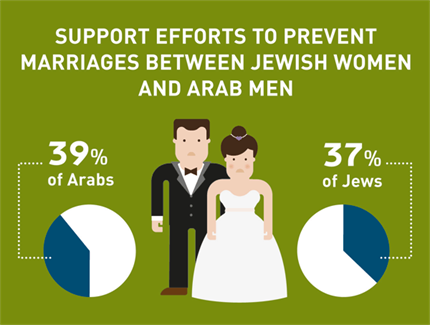
Jewish and Democratic
The Nature of the State
Jewish Israelis are split fairly evenly between those who consider the “Jewish” part and those who consider the “democratic” part of Israel’s definition as a “Jewish and democratic state” to be more important. This year’s study revealed that 36.6% feel that the “Jewish” aspect is more important, 35.3% feel that the “democratic” aspect is more important, and 26.7% volunteered that the two aspects are equally important.
As in the past, preference for the Jewish aspect of Israel’s dual definition is stronger among ultra-Orthodox (100%), Orthodox Jews (70.9%), respondents on the political right (56.8%), and younger people. The democratic aspect is seen as more important by respondents on the political left (70.1%), secular Jews (53.4%), and respondents in older age groups.
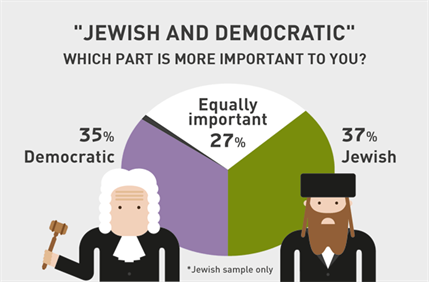
An International Comparison
In 2015, Israel is once again ranked at the midpoint or higher in most of the democracy indicators studied. Israel stands out favorably in measures of life satisfaction and political participation, but the areas of civil liberties and social policies have room for improvement.
High Marks – Israel ranks very high for political participation. Its position is second among 28 countries, just below Norway. Israel’s performance in life satisfaction also ranks very high—third out of 19 countries.
Low marks – Of the 17 countries included in the social policies indicator, Israel ranks rather low, tied for positions 12 and 13. Israel’s ranking for civil liberties is also low, as it is tied for positions 19 and 20 of the 28 countries studied.
Average marks – Of 28 countries, Israel ranked at or near the middle of the scale when it comes to a combined indicator of political rights andm civil liberties (14th place), freedom of the press (13th place), functioning of government (tied for slots 10–15), and perceptions of corruption (tied for slots 11 and 12).
Note that the English Index is an abridged version of the Hebrew original. The full Hebrew text includes additional figures and analyses.
The Israeli Democracy Index 2015 (English)
The Israeli Democracy Index 2015: Highlights
The Israeli Democracy Index 2015 (Hebrew)
The Israeli Democracy Index 2015: Highlights (Arabic)
SPSS File
To access the Israeli Democracy Index of previous years in both Hebrew and English, click here.
